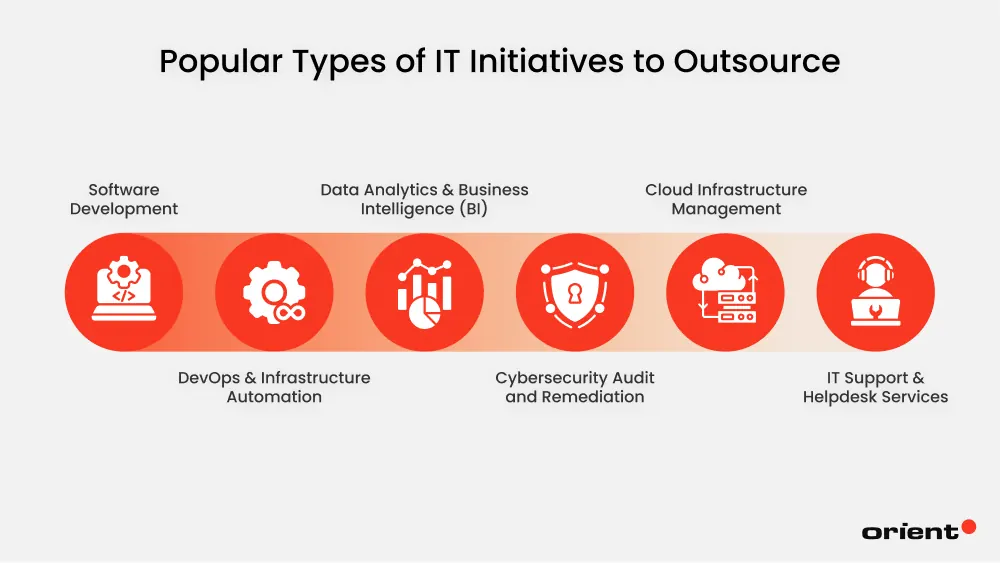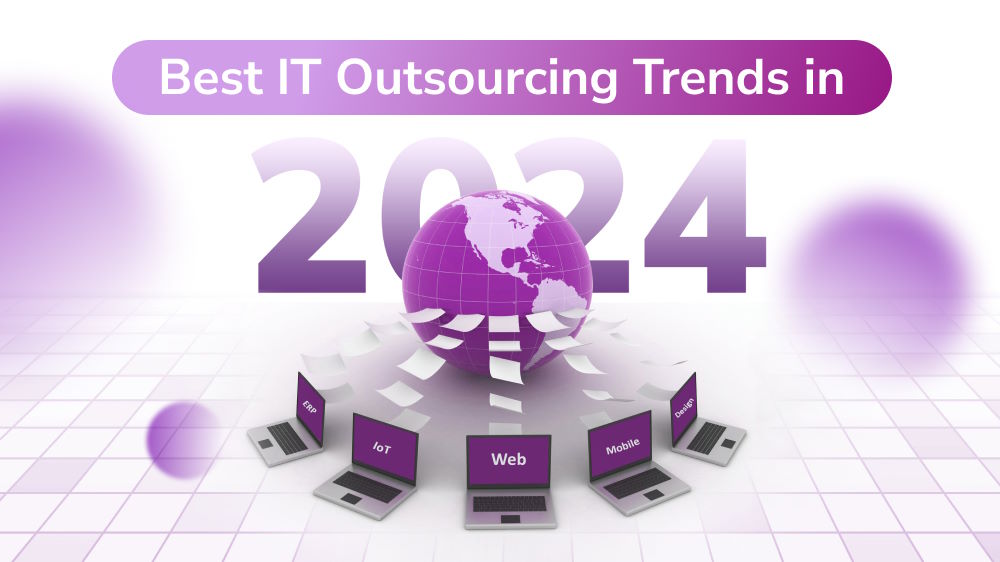
Why Smart Companies Consider IT Project Outsourcing: A Guide for Business Owners
Thinking about delegating your IT needs to an external service provider? Let’s cut through the noise and learn why modern companies and enterprises should choose outsourcing as a strategy.

Content Map
More chaptersIt is no longer true to refer to outsourcing as a trend as it is now the go-to strategy for all-sized organizations to reduce costs while enhancing efficiency. Nowhere is this more evident than in the tech industry where companies are often under constant pressure to do more with leaner teams while coping with budget constraints and lack of in-house expertise.
In such a context, outsourcing IT projects becomes the strategic imperative to accelerate innovation and boost long-term business growth without straining internal resources or breaking the bank. Moreover, the increasing complexity of digital transformation initiatives is also a driver that motivates startups, SMBs, and enterprises alike to seek innovative solutions through third-party partnerships.

As the title implies, this will be a guide that helps business owners and decision makers deeply understand IT project outsourcing, the benefits it offers, and how to approach it right.
Key Takeaways:
- IT project outsourcing is a strategic move, not just a cost-cutting tactic, used to gain access to specialized expertise, drive business efficiency, and support digital transformation.
- It goes beyond software development, covering cloud infrastructure, DevOps, cybersecurity, data analytics, and IT support.
- Flexible models like staff augmentation, dedicated teams, and managed services let businesses tailor outsourcing to their own needs.
- Key benefits include cost savings, scalability, faster delivery, specialized talent, and better focus on core business areas.
- Success depends on a clear strategy, strong communication, the right partner, and a collaborative approach from the start.
What Is IT Project Outsourcing?
The delegation of IT-related tasks, projects, or functions to external service providers is what we call “information technology (IT) project outsourcing.” The simple logic here is that you outsource what you lack to execute an IT initiative - whether it’s time, resources, specialized expertise, or infrastructure. A suitable outsourcing partner specializes in delivering end-to-end IT solutions tailored to your particular project scope and requirements.

IT Outsourcing Models
IT project outsourcing services can take different forms, and you can choose the model that best suits your business needs.
IT Staff Augmentation
This outsourcing model involves hiring external professionals (e.g., cloud engineers or DevOps) to join the in-house IT teams on a temporary basis. This augmented staff brings forth specialized skills and experience to bridge the technical gap and scale up capacity.
Service-Based/Project-Based Outsourcing
It is the core model wherein you entrust the full responsibility for a defined project or service to the service provider. You can decide which parts or the whole project to hand over to the vendor. With clearly defined deliverables, scope, timeline, and budget, the outsourcing provider will handle everything, and you are only involved at key milestones or reviews. For example, a company outsources the full migration of its legacy systems and data to cloud platforms like AWS or Azure.
Dedicated Team
This is a strong fit for software development projects, especially complex ones. An outsourcing team is assembled and managed by the service vendor, collaborating with your in-house counterpart and working exclusively on your projects usually over the long term. A dedicated development team typically includes developers, QA engineers, UI/UX designers, project managers, and other roles as required, operating semi-independently while aligned with your business goals and timelines.
Managed Services
This refers to a model in which a managed service provider (MSP) assumes the ongoing role in managing and maintaining specific IT functions, systems, or infrastructure under a Service Level Agreement (SLA).
Onshore/Nearshore/Offshore Outsourcing
These are location-based models that define where your outsourcing partner is located in relation to your business. This model impacts various factors. For example, communication, collaboration, cost, time zone alignment, and cultural fit.
Does It Differ from Outsourcing Software Development?
IT project and software development outsourcing are related but distinct concepts within the broader practice of delegating IT work to an external service provider. The former is an umbrella term encompassing not only coding but also a wide range of IT-related functions and services. Meanwhile, the latter focuses specifically on the design, development, testing, and maintenance of software solutions.
Here is a side-by-side comparison of IT project outsourcing and software development outsourcing.
| IT Project Outsourcing | Software Development Outsourcing | |
|---|---|---|
| Definition | Outsourcing specific IT-related tasks, projects, or entire functions to an external provider. This can include software development, infrastructure management, testing, cybersecurity, cloud hosting, etc. | Specifically outsourcing the development and management of software projects to an external team or third-party provider, focusing on coding, application creation, system upkeep, and QA testing. |
| Scope | Broader scope covering various IT services beyond software development, such as IT maintenance, cloud infrastructure, data analytics, cybersecurity, and more. | Narrower scope focused on software development tasks only, including application building, system performance evaluation, and software maintenance. |
| Engagement Models | Includes dedicated teams, staff augmentation, project-based outsourcing, managed services, etc., tailored to different project needs and levels of control. | Similar models exist (offshore, nearshore, onshore, dedicated teams, project-based, staff augmentation), but all centered on software development tasks. |
| Use Cases | Suitable for companies needing to outsource entire IT projects or multiple IT functions to focus on core business activities or gain technical expertise. | Ideal for businesses lacking in-house software development capabilities or seeking to reduce costs, access specialized skills, and accelerate development cycles and software delivery. |
| Examples | Outsourcing a full IT project like building a SaaS platform, managing cloud infrastructure, or cybersecurity services. | Hiring an external team to develop a mobile app, web application, or maintain software systems. |
The Benefits of Outsourcing IT Projects
There are many good reasons why outsourcing IT needs can be beneficial for companies across industries. Let’s take a closer look at the benefits outsourcing offers:
Significant Cost Savings
The most compelling benefit that business owners aim at when deciding to outsourcing must be cost efficiency and budget optimization. How can outsourcing help you cut down on costs?
Hiring an entire internal department or a few staff to handle one or several specific IT-related tasks can cost you a fortune, especially when you lack in-house expertise. Typically, full-time employees require considerable amounts of money for salaries, equipment, licenses, training programs, and many other expenses. When outsourcing, you can eliminate these expenses and instead pay only for deliverables and outcomes.

Not only does outsourcing reduce operational and labor costs, but it also helps ensure resources are aligned with actual demand and budgets are used more effectively. Rather than investing in permanent staff for every technical role, business owners can selectively outsource what they need, precisely when they need. It means you only spend money on active resources and services, not on idle capacity. Especially when it comes to short-term or temporary needs, outsourcing enables you to avoid underutilized talent and unnecessary overhead.
By outsourcing, you also gain the agility to scale your resources up or down to adapt to changes in business needs easily without the financial and administrative overhead of traditional hiring. For businesses that engage in IT outsourcing on a regular basis, this benefit can compound in the long term.
Access Specialized Expertise
With tech talent shortages escalating into a global concern, outsourcing is the open door to highly skilled professionals and niche specialists, typically including cloud architects, AI engineers, security analysts, compliance specialists, business analysts, and more.

By collaborating with IT service providers, you can tap into a pool of global tech talent and seasoned specialists who bring forth cutting-edge technologies (e.g., AI, machine learning, blockchain), development best practices and years of experience across areas, such as cloud architecture, DevOps, data security, enterprise software, and more. This depth and breadth of expertise help companies execute their complex IT projects with technical precision and confidence.
Focus on Core Competencies

Another competitive edge when outsourcing your IT needs is that you can focus on the strategic areas of business while offloading non-core or highly technical IT functions to a trusted vendor. This way enables you to allocate resources more effectively, and your internal teams will be less distracted by technical details outside their domain. And this enables you to drive results faster and more efficiently, which is a key differentiator in competitive markets.
Scalability and Resource Flexibility
The on-demand nature of outsourced services gives organizations the ability to adjust the size and composition of their technical teams rapidly based on real-time business needs. You can easily scale up resources during critical phases and ramp down once the peak demand has passed, which is otherwise difficult to do with in-house IT teams or departments. This elasticity eliminates the overhead of maintaining idle staff during slower periods and reduces the risk of overextension during high-demand cycles.

Plus, outsourcing companies maintain bench strength across multiple skill sets and tech stacks, which makes it easy and fast to onboard the right talent when needed, not to mention the fact that their professionals are already well trained and experienced.
Beyond team scale, resource flexibility also extends to skillset adaptability. As your project evolves over time, you may require different technical competencies, such as transitioning from infrastructure provisioning to DevOps automation, or from development to cybersecurity hardening. With professional support from an outsourcing partner, you can swiftly reconfigure your team to meet the shifting requirements without undergoing restructuring or disruption.
Efficient Project Management

Experienced service providers often come with mature project management capabilities. When working with the right outsourcing provider, they will bring in structured project governance, proven methodologies, and time-tested quality assurance processes to help you manage your project effectively.
Improved Compliance

Reputable outsourcing partners are often better positioned to enforce specific regulatory frameworks, such as GDPR, HIPAA, SOC 2, ISO 27001, or PCI-DSS, and maintain audit trails to help clients remain compliant and secure across regions and industries. Don’t underrate this benefit when outsourcing IT-related processes, particularly if your business is in highly regulated sectors, such as finance, healthcare, education, and insurance.
Popular Types of IT Initiatives to Outsource
As mentioned above, IT project outsourcing is not limited to basic tech support or software engineering. It spans a broad range of complex and high-impact IT initiatives.

Software Development
This remains the top outsourced IT initiative until now due to the soaring demand for new applications and digital products. Most of companies and organizations decide to contract out their projects in order to reduce costs, access specialized expertise, and accelerate delivery of high-quality software solutions.
Businesses can entrust the entire software development lifecycle or specific components of it, such as planning, coding, UI/UX design, QA testing, etc., to their partners. Service vendors provide dedicated project support and required resources, including technologies, tools, talent, or dedicated teams of professionals who can work as extensions of the internal staff.
Depending on the organization’s goals, technical needs, and target end-users, custom software services, decision makers can decide which types of software development. For example, enterprise software solutions for large-scale operations, SaaS product development for cloud-based service delivery, web development and mobile app development, or embedded systems for hardware integrations. Also, you can outsource legacy system modernization, API development, or integration services to enhance interoperability between systems.
DevOps & Infrastructure Automation
Outsourcing DevOps and infrastructure automation tasks is particularly beneficial for companies, especially traditional organizations undergoing digital transformation or seeking to streamline deployment pipelines without maintaining large in-house operations teams.
DevOps requires specialized knowledge in automation, CI/CD, and infrastructure orchestration. Rather than building an in-house DevOps team from scratch, you can leverage outsourced expertise and experience to improve deployment speed, reduce downtime, and optimize infrastructure costs. A reliable partner will handle the heavy lifting. They set up CI/CD pipelines to automate infrastructure provisioning, implement monitoring solutions, and ensure reliable, scalable system operations.
Data Analytics & Business Intelligence (BI)
In the era where data is a new oil, business owners and entrepreneurs increasingly seek to extract actionable insights that guide and propel their business operations toward success. Many of them turn to outsourcing companies for data analytics and BI functions in order to stay data-driven without building costly in-house capabilities.
The outsourcing process of data analytics and BI involves delegating your raw data, communicating business goals, and reporting requirements to a specialized provider. As your partner, the outsourcing vendor takes full responsibility for execution, ranging from data collection, integration, and cleaning to building dashboards, running analyses, and delivering insights that align with your KPIs.
Cybersecurity Audit and Remediation
In today’s digital era, cybersecurity transcends a concern but becomes the top priority of all organizations alike. By partnering with an external expert, your business can concentrate on the core operations while ensuring digital assets are well protected.
Typically, a trusted IT security partner conducts comprehensive assessments, including vulnerability scans, penetration testing, and detailed risk analyses. They are responsible for clear, actionable remediation plans and implementation of robust technical safeguards, such as firewalls, intrusion detection systems, and endpoint protection.
Cloud Infrastructure Management
Organizations are increasingly shifting away from traditional on-premises systems toward scalable, cloud-native environments or switching between cloud platforms (e.g., AWS to Azure) in order to improve agility, scalability, and cost efficiency. By outsourcing these responsibilities to experienced cloud service providers, business owners can harness the full power of cloud computing without the burden of building and maintaining these capabilities in-house.
Specialized providers manage the entire migration journey, including legacy system assessment and planning, workload prioritization, data migration, and application re-architecture if necessary. They also handle post-migration validation to ensure stability and performance.
In addition, these providers are responsible for provisioning virtual machines, configuring network architecture, automating scalability mechanisms, and implementing robust monitoring, backup, and disaster recovery protocols. All are critical components of secure and resilient cloud infrastructure.
IT Support & Helpdesk Services
More often than not, startups or small companies operate with no IT departments, so they tend to leverage external support. This makes IT support and helpdesk functions one of the most frequently outsourced business processes.
Outsourcing ensures consistent, high-quality technical assistance without the overhead of maintaining a full in-house support team. The providers can tailor services to your needs based on different support levels:
- Tier 1: Basic troubleshooting and user assistance, such as software installation, password resets, printer or connectivity issues, and other basic usage questions.
- Tier 2: Handle more complex issues requiring deeper technical knowledge and access to backend systems, such as software configuration problems, network connectivity diagnostics, systemic performance issues, security alerts, etc.
- Tier 3: Advanced support at the specialist or engineering level. It involves working closely with the internal IT department to resolve systemic or recurring issues, such as root cause analysis of critical failures, infrastructure-level issues, custom software debugging or patch development, major security breaches, or system downtime resolution.
Last Notes
When it comes to delegating IT projects to a third-party company, outsourcing costs are considerably lower than building and maintaining a full-time team with equivalent expertise, infrastructure, and operational capabilities for specific tasks and IT functions. There are still many more benefits, as we indicated above. When leveraged strategically, IT outsourcing can be more than a tactical decision but become a business performance accelerator in the long run.

A successful IT outsourcing initiative should start with a clear, well-defined strategy that outlines what to outsource, why, and to whom. You can begin by identifying internal gaps, prioritizing high-impact functions, and selecting the right outsourcing partner whose technical capabilities, cultural fit, delivery approach, and proven track record fully align with your specifications from the outset.
Moreover, building a strong, trust-based relationship and maintaining consistent, structured communication between in-house and outsourced teams are essential for seamless collaboration and mutual success. Make sure you communicate with your partner on communication channels, project governance structures, and escalation procedures. Do not forget to incorporate risk management practices to handle uncertainties and ensure accountability through engagement. Last but not least, always remember that a sound strategy should elevate IT project outsourcing from a simple transactional arrangement into a structured, result-oriented partnership that delivers measurable business value. Once the foundation is in place, you are well-positioned to begin outsourcing with confidence.

And Orient Software can be your aid. Who are we? A top-tier IT outsourcing service provider based in Vietnam. We offer our clients a complete suite of services and solutions catered to their specific demands and project requirements. Our IT consulting services connect you with our experts and help you define the right strategy, choose the best-fit technologies, and plan each stage of your IT project with clarity and confidence.
As your trusted technology guide, we can help you turn challenges into opportunities with smart, efficient, and future-ready IT solutions. Contact us for further discussion today.






